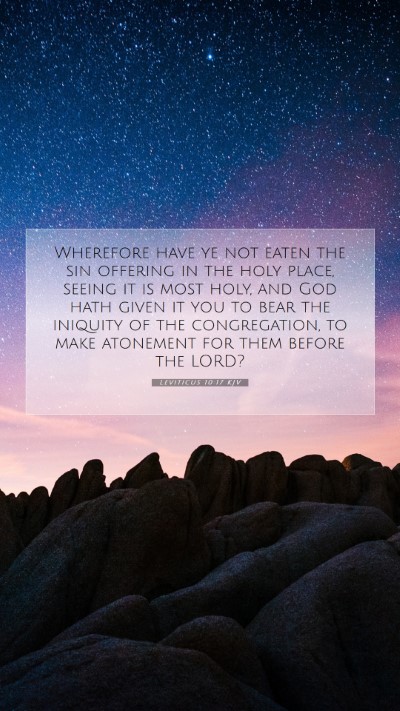Understanding Leviticus 10:17
Bible Verse: Leviticus 10:17 - "Wherefore have ye not eaten the sin offering in the holy place, seeing it is most holy, and God hath given it you to bear the iniquity of the congregation, to make atonement for them before the Lord."
Verse Meaning and Interpretations
Leviticus 10:17 highlights the importance of adhering to God's instructions regarding offerings and sacrifices. This verse serves as a reminder that the rituals surrounding offerings are not mere formalities but are imbued with significant spiritual meaning.
1. Importance of Holiness
According to Matthew Henry's Commentary, God's demand for the priests to consume the sin offering symbolizes the necessity of internalizing the atonement process. The act of eating the offering reflects a deeper assimilation of the sacrifice's significance—bearing the iniquities of the people in a holy manner.
2. Responsibility of the Priests
Albert Barnes notes the critical role of the priests in making atonement for the congregation. He emphasizes that the priests were appointed to carry the weight of the people's sins and that failing to follow divine instructions could lead to dire consequences.
3. Atonement and Community
Adam Clarke elaborates on the communal aspect of this verse. The sin offering was not only for individual transgressions but for the collective sins of the congregation. Clarke suggests that understanding this communal dynamic enriches our comprehension of Israel's sacrificial system and emphasizes the interconnectedness of community worship.
Key Themes in Leviticus 10:17
- Sacredness of Offerings: The offerings are regarded as sacred and must be treated with utmost respect.
- Divine Authority: The instructions from God are authoritative and must be followed to maintain holiness.
- Atonement as a Process: Atonement involves more than just the act of sacrifice; it includes the faithful observance of rituals.
- Community Responsibility: Individuals' actions within a religious community can impact the entire congregation.
Application of Leviticus 10:17 in Daily Life
For modern readers, Leviticus 10:17 invites reflection on how rituals and practices in religious life are understood and enacted. The principles of holiness, responsibility toward communal sin, and the need for sincere atonement resonate with contemporary issues within faith communities. Engaging in Bible study groups or online Bible study can provide deeper insights into the application of these values today.
Cross References
- Exodus 28:38 – Discusses the role of Aaron and his sons in bearing the iniquity of the people.
- Leviticus 4:20 – Explains the importance of consuming the sin offering for atonement.
- Numbers 18:10 – Addresses the priests consuming holy offerings in the sanctuary.
Conclusion
Understanding Leviticus 10:17 requires a comprehensive approach that incorporates Bible verse meanings, Bible verse interpretations, and the context of the sacrifices demanded by God. This verse serves as a potent reminder of the sacred nature of religious practices and the profound implications they have for both individuals and communities today.
Further Exploration
For those looking to delve deeper, consider Bible study tools and Bible study guides that provide frameworks for examining difficult passages. Engaging with historical contexts, exploring symbolism in Scripture, and reviewing interpretations from different commentaries can enhance understanding and application in daily life.


